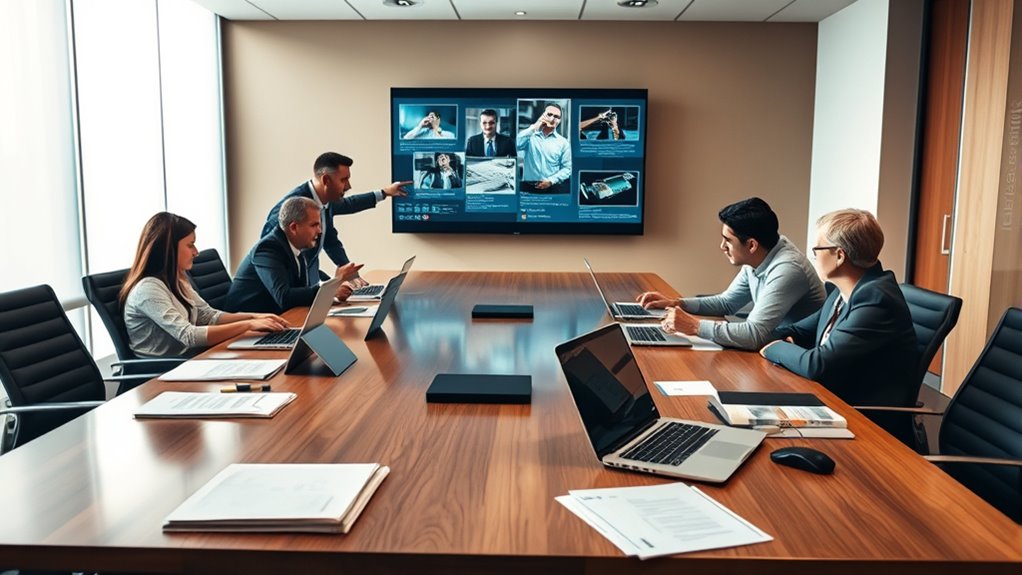After each investigation, your team conducts a thorough debrief to understand what happened, identify lessons learned, and enhance future response efforts. You share insights openly, discussing successes and weaknesses to spot areas for improvement. Documenting these lessons helps prevent repeating mistakes and solidify best practices. This process turns insights into concrete actions like training updates or process changes. Keep exploring to discover how these reviews strengthen your team’s ability to handle cases effectively.
Key Takeaways
- Conduct a comprehensive team meeting to discuss the investigation’s findings, insights, and areas for improvement.
- Share detailed reports and documentation to ensure transparency and collective understanding.
- Analyze successes and challenges to identify process gaps and lessons learned.
- Document actionable recommendations and assign responsibilities for implementing improvements.
- Follow up on changes, monitor outcomes, and refine procedures to enhance future investigative reviews.

After completing an investigation, a thorough debrief is essential to understand what transpired, identify lessons learned, and plan next steps. This is your opportunity to evaluate every aspect of the case, from how your team communicated to the effectiveness of your processes. Effective team communication plays a vital role here; it ensures everyone shares their insights, raises concerns, and contributes to a complete understanding of the incident. When your team openly discusses their perspectives, it prevents overlooked details and promotes a culture of transparency. Additionally, emphasizing clear communication channels helps avoid misunderstandings and guarantees that all relevant information is available to inform your next steps.
During the debrief, focus on analyzing what worked well and what could be improved. This reflection often uncovers process gaps or inefficiencies that may have hindered the investigation’s success. For example, perhaps you discover that information sharing was delayed due to unclear procedures, or that certain team members were unsure of their responsibilities. Recognizing these issues allows you to implement process improvements that streamline future investigations. These improvements can include refining standard operating procedures, adopting new tools, or establishing more effective communication protocols. The goal is to create a more efficient, cohesive workflow that reduces errors and accelerates resolution times.
Analyzing successes and weaknesses uncovers process gaps, leading to more efficient, cohesive investigations.
Another key aspect of the debrief is identifying lessons learned. These lessons aren’t just about what went wrong but also about what can be reinforced or replicated. Documenting these insights helps your team avoid repeating mistakes and solidifies best practices. When lessons are shared openly, your team becomes more resilient and better prepared for future cases. Furthermore, this collaborative approach fosters a learning environment where everyone feels valued and invested in continuous improvement.
As you review each case, keep the focus on actionable steps. Turn insights into concrete plans, whether it’s scheduling additional training, updating documentation, or revising communication strategies. Assign responsibilities and set deadlines to guarantee these process improvements are implemented effectively. Remember, a successful debrief isn’t just about reflection; it’s about transforming what you learn into tangible improvements. This cycle of review and refinement strengthens your team’s capabilities and enhances overall performance.
Frequently Asked Questions
How Long Does Each Debrief Session Typically Last?
You might wonder how long each debrief session lasts. Typically, these sessions align with the investigation timeline and can range from 30 minutes to an hour. During debrief preparation, your team reviews key details, guaranteeing everyone’s on the same page. The duration depends on case complexity, but your team aims to keep it thorough yet efficient. This approach helps improve future investigations and guarantees complete case reviews.
Who Participates in the Post-Investigation Debrief Process?
You participate in the post-investigation debrief process alongside team members, supervisors, and sometimes external experts. This collaborative approach guarantees investigation feedback is thorough and aligns with debrief best practices. Everyone shares insights, discusses findings, and identifies areas for improvement. Your active involvement helps refine procedures, enhances team learning, and promotes accountability, ultimately strengthening the investigative process and fostering a culture of continuous improvement.
How Are Debrief Findings Communicated to Clients?
Think of debriefing like sharing a map after a journey—you want clients to see exactly where you went and what you found. We deliver debrief findings through clear communication, including detailed debrief documentation and client feedback sessions. This approach guarantees transparency and understanding, allowing clients to ask questions and provide input. By doing so, you keep them informed, involved, and confident in the process and outcomes.
What Tools or Software Are Used During Reviews?
During reviews, you use investigation software and review tools to analyze case details efficiently. These tools help you organize evidence, track findings, and identify patterns quickly. You might rely on specialized investigation software for case management and review tools for document analysis or collaboration. By leveraging these technologies, you guarantee thorough, accurate reviews, enabling your team to make informed decisions and improve overall investigation quality.
How Is Team Performance Improved After Debriefs?
Imagine a sports team analyzing game footage to improve. After debriefs, you see stronger team collaboration and focus on process optimization. This reflection helps identify strengths and areas for growth, leading to targeted training and clearer communication. As a result, your team works more efficiently, makes fewer mistakes, and achieves better results. Regular reviews foster continuous improvement, turning lessons into actionable steps that boost overall performance.
Conclusion
By joining our post-investigation debrief, you become part of something truly extraordinary. Every case you review isn’t just a report—it’s a chance to change lives, save future victims, and rewrite the course of justice itself. Your insights could be the difference between chaos and clarity, between despair and hope. This is more than a routine step; it’s your moment to make history. Embrace it, because what you do here echoes forever.









